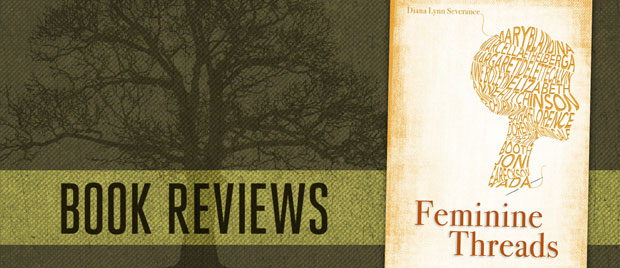Feminine Threads

“Christianity is a religion of history.” With these words, Diana Lynn Severance launches into a comprehensive survey of church history from the New Testament to the present day. As is obvious by the book’s title, Feminine Threads: Women in the Tapestry of Christian History is a survey intended to be selective. Severance brings two particular aspects of church history into sharp focus: the roles of individual women in that history and the way the church has thought about women through the centuries.
Dr. Severance is well equipped to write such a survey, having taught “Women in Church History” courses in various seminaries. She has two stated purposes in writing. The first is to encourage readers by providing narrative accounts of godly women, many of whom have made significant contributions in the advance of the gospel through the years. A second purpose for the book is the exposure of the roots of much of the current unbiblical thinking on gender and women. The author’s hope is that, as modern-day Christians see how some of this thinking has evolved, they will more clearly grasp the unbiblical nature of its ideas.
Feminine Threads begins with the New Testament era and progresses on through early and late antiquity, early and late Middle Ages, the Reformation and its aftermath, both Great Awakenings, the Victorian Age, and modern times. Each chapter highlights specific women of that time counted as Christians. Some were slaves; some were queens. Some lived secluded lives, while others traveled the world as missionaries, teachers, or preachers. Some raised many children; others chose celibacy. And some valued the Bible supremely as the Word of God, while others put greater faith in their own subjective thoughts and experience. Severance includes them all, providing first a caveat in a note to the reader called “Tares Among the Wheat.” As Christ taught in his parable, she warns, the church has always included tares among the wheat. This is true both in terms of individual professing Christians, whose practice falls short of biblical teaching, and in terms of beliefs and ideas the church and individual Christians have held. In a fallen world, even the most faithful believers will have some inconsistencies in their thought and practice. Severance freely admits the reader will find both tares and wheat in this survey, and calls upon Christian readers to exercise discernment in comparing the lives and the teaching described in Feminine Threads with the clear principles of Scripture.
As Feminine Threads moves through the centuries, Severance provides, as background, brief synopses of history in general for each era. She then describes the ideas held by the church of that time, specifically ideas related to women. This is what especially fascinated me. As I moved from chapter to chapter, I could follow the rise and fall of biblical thought—and unbiblical thought. For any who have ever wondered where the idea that celibacy is better than marriage originated or how a cult worshiping Mary developed or for any who have thought—erroneously—that the Puritans were prudes when it came to romantic love and sex, this is enlightening reading! In addition to the text, boxes and charts appear on many pages, giving additional historical insights in capsule form. A few examples are: “Women Martyrs in the Early Church;” “Were Women Priests?”; “Mary Magdalene, Fact and Fiction;” “Christian Queens of Influence among Franks and Anglo-Saxons;” “American Voluntary Societies” (having Christian women at the forefront); and “Five Unmarried Woman Missionaries.”
Both in her narrative accounts of women and in her mini-lessons on church thought, only occasionally does Severance interject her own opinions. She provides objectivity and, as often as possible, allows the women and church leaders to speak for themselves, using their writings to show us what they did and thought.
In fact, readers from a Reformed background may consider that to be a negative. Included along with Sarah Edwards, Susanna Wesley, and Elisabeth Eliot are Teresa d’Avila and other mystics and Aimee Semple McPherson, preacher and founder of the Foursquare Gospel Church. Some might think they have no place in a book that highlights contributions of Christian women to the church. It is at least certain that such women have influenced the church in important ways. Often, Severance simply describes the contribution and allows the reader to determine whether it was for good or for ill. On the other hand, feminist readers will no doubt take offense at the reminders of the Bible’s teaching on women that are woven throughout the work. If folks on both sides of the issue feel a little offended, then I believe Severance has done what she set out to do: provide an objective look at the history of women and the church and remind us of what the Bible actually teaches about women.